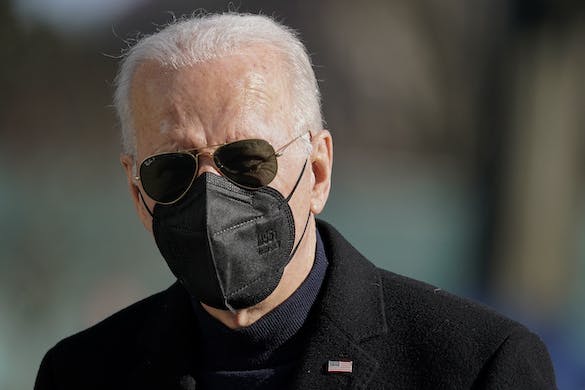With Friends Like Biden …
Biden’s been in office barely more than a year, but he’s already betrayed enough allies that “America will have the backs of our friends in the region” sounds like a cynical lie.

“America will have the backs of our friends in the region.”
That was the final sentence of a February 10 White House statement from the national security advisor, Jake Sullivan, responding to a terrorist attack that killed at least a dozen civilians in Saudi Arabia.
Mr. Sullivan surely intended it sincerely. To anyone who has been watching what has been happening in the Biden administration, though, the language sounds more like bitter comedy or, at best, wishful thinking.
Note the future tense. Not “America has the backs of our friends,” but “America will have the backs.”
Maybe when a different president takes over.
Mr. Biden’s been in office barely more than a year, but he’s already betrayed enough allies that “America will have the backs of our friends in the region” sounds like a cynical lie. It’s a falsehood on par with that favorite from the administration in which Mr. Biden was vice president, “If you like your health care plan, you can keep your health care plan.”
How has Mr. Biden treated America’s friends?
He held back $130 million in military aid to Egypt, citing human rights concerns.
He sanctioned two Israeli technology companies, reportedly for selling services to Saudi Arabia.
Despite Israeli opposition, he’s been trying hard to get America back into the Iran nuclear deal that would provide Israel’s enemy with $700 billion in sanctions relief.
He pulled out of Afghanistan, leaving our former allies there at the mercy of the Taliban. According to a U.N. report, since America left, more than 100 individuals have been victimized by the Taliban in “revenge killings.”
He’s failed to consummate a $23 billion weapons deal with the United Arab Emirates that had been teed up by the Trump administration. The Associated Press described that as “a rare dispute between Washington and a key U.S. ally in the Persian Gulf.”
It turns out that such disputes are not actually so rare, at least under Mr. Biden.
Nor is Mr. Biden’s treachery limited to the Middle East.
He mishandled relations with France via clumsy communication about a submarine deal with Australia. France went so far as to recall its ambassador from Washington in protest.
He annoyed Poland by meeting with President Putin on a trip to Europe but not making time for the Poles, and also by waiving sanctions on the Nord Stream 2 pipeline between Russia and Germany.
He snubbed Britain by lifting Trump-era tariffs on steel and aluminum from the European Union, but not from the post-Brexit United Kingdom. Public radio’s “Marketplace” show quoted a businessman and former member of the European Parliament for the Brexit Party, John Longworth, as saying, “It’s almost as if the United States has taken the decision to punish one of its greatest allies.”
Almost.
Canada is another friend Mr. Biden has insulted. “A weakened Biden throws Canada under the bus, again,” was the headline over a column in the Globe & Mail by Konrad Yakabuski about an oil pipeline. He wrote, “Forced to pick sides in a dispute that pits the progressive wing of the Democratic Party against his country’s closest ally, Mr. Biden is once again throwing Canada under the bus.”
Journalists have incentives to exaggerate minor spats into international crises. Politicians often have incentives to paper over disputes so it doesn’t appear as if they are mishandling relations with allies. If America gave all our friends everything they want all the time, we’d be in a pickle, as sometimes the interests of allies conflict with one another, or with America’s national interest.
But when Mr. Sullivan says, “America will have the backs of our friends in the region,” no one believes him. The reality is that America will have the backs of our friends only when it’s not too costly, or too politically inconvenient, or until the support exceeds America’s limited abilities and attention span.
When the “have the backs of our friends” rule conflicts with some other principle or value or desire or priority, the friends may find themselves out of luck, thrown under the bus, punished, snubbed. Or they may find themselves redefined out of friendship into some other category.
As a presidential candidate, Mr. Biden faulted President Trump for “raising doubts among our allies around the world about America’s security commitments.” Mr. Trump wasn’t perfect, either, but anyone taking Mr. Sullivan’s word that “America will have the backs of our friends” should prepare for a knife between the shoulder blades.
________
Mr. Stoll is editor of FutureOfCapitalism.com and author of JFK, Conservative.

